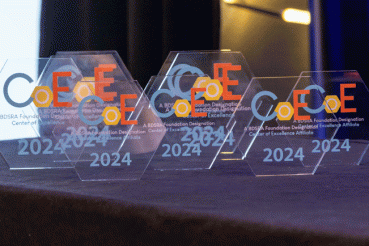May 24, 2019
When Adam Denny brought his twins to their pediatrician for their 18-month wellness visit, he received a prescription – but did not need to go to the pharmacy to fill it. It was a “prescription for play,” and it came with a small pack of LEGO® DUPLO® bricks for each child. The directions: Play daily for at least 15 minutes.
To encourage play and teach parents the benefits of play in their children’s lives, Rush Copley Medical Group is participating in the “Prescription for Play” program created by Lego, which is donating the toy bricks and prescription cards.
“I think this program is great as a reminder to take time to focus on just playing with your child every day — no distractions. No cell phones, no TV, no other discussions,” said Megan Muscia, DO, FAAP. “In the busy world we live in, it can be hard to remember to take time just to focus on nothing else but your child for 15 minutes every day. Play is so important for children’s development; it allows for increased flexibility, creativity and willingness to try new things. It helps support the development of safe, stable and nurturing relationships with caregivers.”
The “prescription for play” Duplo packs contain several of the colorful plastic bricks which can be used to create an animal and then rebuilt in new shapes, encouraging a child’s imagination and motor skills. The play prescription suggests ideas for playtime and lists the benefits of play. Rush Copley Medical Group pediatricians began giving these “prescriptions” and play packs to children ranging in age from 18 months to three years at their wellness visits in April.
Play is a fundamental part of a child’s healthy development and boosts learning, according to a report by the American Academy of Pediatrics, or AAP. It increases social-emotional, cognitive, language and self-regulation skills. In addition to being “brain-building,” play nurtures safe and stable relationships which can be a buffer against stress.
Free play helps children learn skills which are necessary for success in life, including the ability to collaborate, solve problems and think creatively. Free play is encouraged over play on computer and phone screens because screen time for children younger than age two may result in slower development. Because of this, doctors recommend against any screen time for children younger than two and limiting screen time for children over age two to no more than two hours a day.
In addition to encouraging parents to play with their children, Rush Copley doctors are promoting the importance of reading by giving a free book to each patient between the ages of six months and five years during their wellness visits. By participating in the “Reach Out and Read” program, Rush Copley Medical Group pediatricians in Oswego and Aurora promote early literacy and school readiness. Since they began the program in June 2018, they have distributed more than 3,000 books.
The gift of a book “turns a doctor’s appointment from something that can be a little scary into something exciting,” say Stacy and Chris Skinner, parents of triplets. The Skinners make it a priority to read to their children every night at bedtime and enjoy the special bonding time it provides. They say their children look forward to receiving a book at each visit to the doctor.
Research has shown that participation in the program by pediatricians has a significant impact on parental behavior and attitudes toward reading – and results in improvements in the language scores of young children. Currently, more than one of every three American children begin kindergarten without the skills needed for success in school. Studies show that reading together is one of the most important things parents can do to positively influence their child’s development. It lays the groundwork for improved concentration, cognition and imagination and helps create a strong sense of trust and intimacy.
Rush Copley’s book program is made possible through the Lynn Barclay Big Heart Family Fund in partnership with “Reach Out and Read.” Managed by the Rush Copley Foundation, the fund was inspired by Lynn Barclay, a pediatric nurse for more than 35 years who was known for her kindness and generosity. Her colleagues were inspired to launch the fund in her honor upon her retirement.



